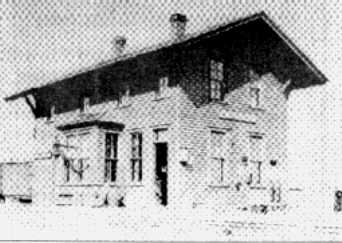The Ostrander Depot
By Sue Doocy
The Chicago Great Western Railroad
was written by Doris Sanders for the Ostrander Centennial 1891-1991, and is the source for much of this article.The railroad depot was the first building raised in Ostrander, (Minnesota) under the name, Winona and Southwestern, which was later changed to the Chicago Great Western in 1894.

"It was the typical railroad station with a pot-bellied coal stove in the center of the waiting room, a slotted ticket window between the waiting room and telegraph office, a bulletin board showing time of arrival and departure of daily passenger trains, and of course, the clicking sound of messages being sent over the telegraph wires." (photo courtesy of the Fillmore County Histroical Society)
Mrs. Evans, a pioneer woman, planted a flower garden in which she spelled out OSTRANDER and after a visit by a railroad official, the depot was painted green to complement the garden.
North and south bound trains transported citizens to Spring Valley, LeRoy, and Rochester for shopping.
"A.B. Stickney was the driving force behind the Chicago Great Western," stated Sanders article. The CGW was considered the "little guy" competing against corporate giants and often on the brink of bankruptcy. The CGW held it's own until September 1, 1968, when it merged after a lawsuit with the CNW, Chicago Northwestern.
Today, the only reminders of the railroad are "the old grade,...an occasional CGW flanger star, a concrete mile-post," and some stone culverts and memories of the people who worked or rode the trains. "The Ostrander station was the last to remain open on the branch line between Rochester and McIntyre, Ia." Spring Valley and LeRoy business was handled at the Ostrander Depot in 1972 until it closed in 1976.
Sanders listed some of the early agents of the CGW: A.M. Nelson who served until 1918; followed by Mrs. A. Regan, in 1918; C.A. Evans, 1918-1942; L.R. Goddard, 1942-1946; H.A. Sanders, 1946-1975; and R. Mans in the last year. She listed Chris Nelson, Ingle Johnson, Don Tolstead, and Leonard Grabau as Section Foremen.
The trains faded out of existence when public highways were built and businesses could ship freight cheaper with semi-tractors and trailer.